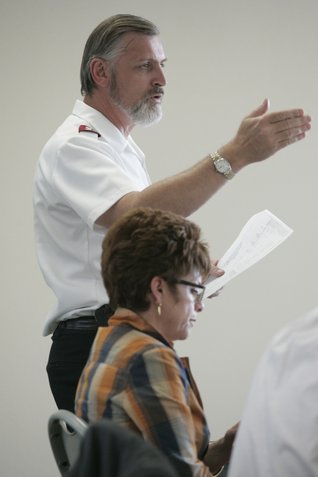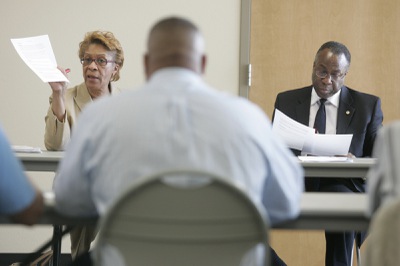
Urban League board Treasurer Maj. William Raihl of the Salvation Army tells board members at the league’s meeting last week that the organization’s current finances are “unacceptable for an organization of this size.”
Thursday, May 1, 2008 | 2 a.m.
Beyond the Sun
Officials for an organization that receives $4.5 million to fight poverty in Southern Nevada heard some startling news last week.
Their nonprofit group, the Las Vegas-Clark County Urban League, had just $33.24 in the bank as of April 11.
“That’s unacceptable for an organization of this size,” said board Treasurer Maj. William Raihl, who delivered the news. Raihl, coordinator of the Salvation Army of Clark County, has served a year on the local Urban League’s board.
The irony was inescapable: A group that has been positioning itself during the past year to be the Las Vegas Valley’s biggest poverty-fighting organization appeared to be facing poverty. That, together with a top-heavy administration and what seems like a high rate of staff turnover, may spell trouble for the Urban League’s efforts in the future.
In his first fiscal report to the board, Raihl went on to explain how the organization had to borrow $90,000 from a line of credit to pay the previous month’s payroll.
“Otherwise we would’ve had some unhappy employees,” he told the 12 men and women gathered in a $10.5 million community center that hadn’t even opened to the public. The room was bordered by soft leather couches and chairs so new that tags from the factory still hung from them. The league’s center was built with county and federal funds. “We don’t have enough cash on hand ... to fully implement programs,” Raihl told his fellow board members. “Cash flow is extremely tight.”
Before the group moved on to the next agenda item, only one board member, former pro football player Napoleon McCallum, tried to drill deeper into this news: How much do we need to correct the situation? Where can we get that money?
The next day, in an interview with the Sun, Raihl added another question: “How did we get into this situation?” Raihl’s query was rhetorical but deserves an answer because the local affiliate of the 98-year-old national group is attempting to fill a void left by another nonprofit organization, the Economic Opportunity Board, which fell apart in 2006 under the weight of mismanaged finances and programs. The Urban League’s slate of programs and services includes a community center for seniors and the federal Women, Infants and Children program, both of which had been run by the former organization.
For four decades, the that group ran all the cradle-to-grave services for the poor in the valley. The effect of its folly is so keenly felt in the local nonprofit world that the state Department of Health and Human Services told the fledgling Urban League in a September letter to “prohibit former EOB board members and staff from serving on the (Urban League) board.” In a column indicating reasons for the directive, a state official wrote, “self-explanatory.”
The state allowed an exception for state Sen. Steven Horsford because he had come to the board shortly before its decline. In an October interview, Vincent Austin, then the Urban League’s chief financial officer, said about one-fourth of the organization’s full-time employees were former EOB employees.
Questions about whether the local Urban League’s finances and turnover are unusual were not answered by the organization’s New York headquarters.
In the same April 23 meeting in which Raihl gave his report, John O’Rourke, senior accountant for the local Urban League, explained that most of the group’s money comes from federal funds administered by the state that can be accessed only after money is spent. In other words, if you don’t have money in the bank to start with, you might get stuck playing catch-up. What was needed, Raihl and O’Rourke explained, were more “nondiscretionary” funds, or a longer line of credit.
But this was not news. Ray Clarke, the local Urban League’s executive director, pointed out in October’s board meeting that the organization would have to raise money in addition to the federal funds already in place. He came to the Las Vegas group in January 2007 after 20 years directing the Tucson Urban League, so he should know.
And a state Health and Human Services Department official, Gary Gobelman, said he has brought up the same funding issue a number of times during the past two years.
The recent board meeting also included the comparatively good news that a recent audit covering the six-month period through June 2007 had no significant negative findings. Still, the state said in January that the local Urban League’s accounting policies and procedures were “unacceptable” and recommended it hire a consultant to help the organization create better ones. Las Vegas accountant Lynda R. Keeton was scheduled to work at the group’s Owens Avenue office for the last two weeks of April at a cost of $10,000. That money would come out of the $2.8 million federal grant administered by the state.
Another issue facing the organization in recent months is turnover. Since the beginning of the year, the Urban League of Clark County has lost its chief financial officer, its communications/governmental affairs officer, a program director and two case managers. One staff member said turnover may have been as high as 50 percent during the past year. But this, like other details about the organization, is hard to pin down, because repeated requests by the Sun over a period of three weeks about staffing, salaries and related issues were only partially answered by Kathleen Paustian, an attorney and recently named spokeswoman for the league. When the newspaper pressed her for turnover and funding details, her response was that she had heard the reporter asked such questions only of “black organizations.”
The combination of what O’Rourke called “very tight” cash flow and high turnover can be hard for a young nonprofit organization, said Laurie Styron, analyst for the American Institute of Philanthropy.
“It would be unusual for a charity to make it with this kind of beginning,” she said.
Lewis Fein, executive director of Public Interest Watch, a Washington-based organization that monitors nonprofit groups, said “excessive turnover is one of the key indicators of trouble at any organization.”
Styron also said the local Urban League affiliate had what appears to be a top-heavy administration, with chief executive officer, chief financial officer, chief operating officer and communications/government affairs positions overseeing a full-time staff of 48.
“Why do you need all these top positions?” Styron said.
In October, Austin said the organization’s four top people plus a computer technician earned about $500,000 in salaries, or about 12 percent of the organization’s total budget. Since then, the organization has not released salary figures.
Paustian said the organization would not disclose current top salaries. “You can submit a Freedom of Information Act request if you want,” she said. The organization’s 2006 tax returns also didn’t indicate the organization’s top five salaries.
Austin had estimated in October that 40 percent of the organization’s budget went to administration and 60 percent to programs. Styron, whose American Institute of Philanthropy grades nonprofit organizations, said this 40-60 split might earn an organization a C. “Most would be able to spend 75 percent on programs,” she added.
Steve Schorr, Cox Communications’ vice president in charge of public and government affairs and a board member until February, was critical of the local Urban League’s failures to answer the media’s questions about finances and programs.
“I don’t think any nonprofit that serves the community can ignore the fourth estate,” Schorr said.
He also said he thought the Urban League’s issues were to be expected given the organization’s newness.
Raihl said he and his fellow board members are just now learning their roles and will help things “turn in a more positive way.”
“The financial issues are not insurmountable,” he said. “They can be corrected.”


Join the Discussion:
Check this out for a full explanation of our conversion to the LiveFyre commenting system and instructions on how to sign up for an account.
Full comments policy